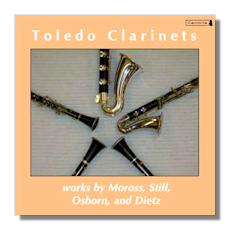
The Internet's Premier Classical Music Source
Related Links
-
Moross Reviews
- Latest Reviews
- More Reviews
-
By Composer
-
Collections
DVD & Blu-ray
Books
Concert Reviews
Articles/Interviews
Software
Audio
Search Amazon
Recommended Links
Site News
 CD Review
CD Review
Toledo Clarinets

- Jerome Moross: Sonatina for Clarinet Choir
- William Grant Still:
- Lyric Quartette
- Christmas in the Western World (Las Pascuas)
- Sean Osborn: Quartet for 4 B Flat Clarinets
- Christopher Dietz: De Profundis
Charles Tipton II, clarinet
Elliott Ross, bass clarinet
The Toledo Clarinets
Cambria CD-1190 66:52
Summary for the Busy Executive: We'll to the woods.
You don't run into a clarinet quartet all that often. In fact, I have heard only two of the pieces on this program before: the Moross and the Still Lyric Quartette. However, I heard the latter in its original string quartet form, so it really doesn't count. Moross wrote his sonatina (for 6 clarinets; the Toledo Clarinets take on two more players) when his publisher assured him a real market clamored for such works. According to Moross, it didn't turn out that way, but he appreciated the publisher taking an interest.
Certain composers appear to sweat and struggle. I suppose Beethoven and Brahms supremely represent that archetype. Almost all composers struggle. Composing, after all, requires a lot of dedicated effort. However, certain rare lucky ones seem to emit music without breaking a sweat or compromising quality: Scarlatti, Handel, Mozart, Schubert, Mendelssohn, and Poulenc. I think of them as "musical composers," naturals. Bach, as usual, occupies a category all by himself. Jerome Moross (also his contemporary Morton Gould) strikes me as a natural. The music never seems forced. It sounds as if he could have made it up on the spot, but his high level of craftsmanship puts that in doubt. You often find that he has solved problems elegantly, without strain or awkwardness, and in the most direct way possible. You also find a strong element of play. The figure of Mozart keeps coming into my head.
All of this comes out in the Sonatina for Clarinet Choir. That this is Moross's first (probably his only) work for the ensemble amazes me. I keep thinking of all the range and textural problems (essentially subtle variations on the same basic color) he had to have solved. Yet the score doesn't come across as a theoretical exercise. The first movement capers about in a Forties Americana vein. Come to think of it, the main rhythm and phrasing are identical to the title theme of Elmer Bernstein's The Magnificent Seven and the lyrical contrast has the family look of the other as well. However, Moross goes for the dance-like rather than the epic. The second movement is a slow, smoke-filled, early-hours blues. The finale alternates between a whirligig unreeling of quick note runs and a long, lyrical line, with a hint of Broadway in it. A short work, but a memorable one, it's as playful as a puppy. You may find yourself humming the themes for weeks afterward.
William Grant Still wrote during the heroic age of classic Modernism, the main African-American classical composer. He studied with Edgard Var&eagrave;se, among others, and went through a short-lived avant-garde phase. He then became a kind of American Tchaikovsky, writing many works based on Black vernacular music but also many others that owed little to blues, spirituals, or jazz. The Lyric Quartette, originally for string quartet and arranged (probably by Greg Kostraba) for clarinets, falls into the latter category. I find its three movements tuneful but a bit predictable, although I must say I prefer the arrangement to the original. The first movement, my favorite, has the title "The Sentimental One," and its quality resembles the folk song "Shenandoah." "The Quiet One" follows. It reminds me a little of Vaughan Williams Pastoralism and English folk song. The finale, "The Jovial One," gives you mostly what you'd expect, with a goofy Near-East strain thrown in to keep things from settling into too-comfortable a groove.
The other Still work, Christmas in the Western World, amounts to a series of postcards from French Canada, Trinidad, the Hispanic Americas, Brazil, and a Still evocation of a spiritual at the end. I find the score workmanlike, but nothing special.
A clarinet quartet, to remain viable, needs repertoire, not just the sweet fluff, but substantial pieces as well. Unfortunately, Christopher Dietz's De Profundis, serious in intent, falls short in substance. One has to applaud Dietz's daring in taking on one of the Biblical masterpieces – daring because the composer deliberately invites you to compare the artistic worth of his music to the poetic worth of the Psalm. Unfortunately, he comes up short – no real surprise. Even if he had titled the piece something else, even something neutral like "Study" or "Sermon," the work has problems. For one thing, nothing really interesting or surprising happens. Ten minutes of it go by without anything sticking.
Sean Osborn's four bagatelles for four B Flat clarinets compounds Moross's problems, particularly the one of range, since only one type of clarinet is specified. Osborn leaps over the hurdles with elán, making use of ingenious antiphony and counterpoint. The first movement, a calm pastoral, leads to a manic "Scherzo." A modal slow movement follows. The lines spread out like heat on a summer day. The finale, "Dorian Dance," resembles the English folk song "Seventeen Come Sunday" in its first strain. It changes mode rather than key, raising the specter of monotony, but it doesn't outstay its welcome, either. An elegant and concise score.
The Toledo Clarinets deliver, on the whole, a very attractive disc. You can't call any of these works warhorses, and the group gives very entertaining accounts. They even manage to make something of the Dietz, with the cards stacked against them. The engineering, although it may not rise to the Hyperion, Telarc, or Chandos level, remains well within current standards.
Copyright © 2010, Steve Schwartz.




















